- Home
- Michael Bond
Monsieur Pamplemousse on the Spot Page 11
Monsieur Pamplemousse on the Spot Read online
Page 11
Monsieur would not be taking the matter further? Not that they had ever done any harm. But a fare was a fare and out of season business was slow. They could do with all the work they could get.
Monsieur Pamplemousse drove slowly and carefully back to Les Cinq Parfaits, partly because he was deep in thought, partly because the repair to his braking-system was only temporary and he still had to rely a great deal on the handbrake.
He took a turn off the main driveway and parked near his room. Feeling in need of a stroll in order to collect his scattered thoughts and marshal them into some kind of order, he set off with Pommes Frites along the same path he had taken the first evening. As they drew near the edge of the woods a gendarme detached himself from a tree, obviously intending to intercept them. Calling to Pommes Frites, Monsieur Pamplemousse hurriedly retraced his steps. For the time being he didn’t want to talk to anyone, least of all the police. They would only ask questions and before that happened he had one or two questions of his own to ask, questions that called for a succession of telephone calls.
Relieved that he hadn’t bothered to return his key to Reception that morning, he slipped in through the side entrance.
His first call was to a Mr. Pickering of Burgess Hill in England, and after two wrong numbers, including a housewife who accused him, not without a trace of hope in her voice, of making obscene telephone calls, he eventually got through.
For some while Le Guide had been toying with the idea of following the lead set many years before by their arch rival Michelin, and issuing a guide to restaurants in the British Isles. The failure of Gault Millau, who had also tried out the idea and had then withdrawn to lick their wounds on safer ground, gave them second thoughts. It appeared on preliminary investigation that British restaurants had enormous subdivisions, reflecting both the diverse nature of the population and its eating habits. Unlike France, where the local restaurant was often an extension of the home, a place where the whole family from grand-mère to the smallest enfant could go for Sunday lunch, and where everything from weddings to christenings was celebrated, eating out was more of a treat, a special occasion, and the menu was constructed accordingly. Classification was difficult.
In all these matters, Mr. Pickering, who had been retained as an adviser on account of his vast and expert knowledge of wine, was a fountain of information, as indeed he was on many other things. Had the guillotine been reintroduced in France, Mr. Pickering would have known the exact weight of blade necessary, the degree of sharpness required, and the height from which it needed to be dropped for a given thickness of neck. Had the Roman penchant for eating dormice been revived in England, Mr. Pickering would have known all about ways of fattening them first on nuts in earthenware jars, how they should be stuffed, and the correct method of cooking them. ‘Regulo 5 for fifteen minutes’ he would probably have said in tones of unimpeachable authority.
Monsieur Pamplemousse had learned a lot about the British since he’d met Mr. Pickering. He felt sure he would know all there was to know about English journaux. In this he was not disappointed. From a brief description of the nature and the type of the cuttings, and with scarcely a moment’s hesitation, Mr. Pickering named it at once.
‘They have a bad record of industrial disputes. Progress is not easy in the printing world. There is a great deal of unrest within the rank and file regarding the introduction of new machinery. Meanwhile the owners soldier on with the old equipment.’
‘You mean … it is actually sold like that? The one I have is not just an early edition – an uncorrected one? They are all like it? Monsieur Pamplemousse tried to keep a rising note of disappointment from his voice.
‘It has a circulation of several million. People get very upset on days when it doesn’t appear.’
‘Several million? Morbleu! Do the readers not care for their language?’
‘Frankly, no.’ Mr. Pickering sounded surprised by the question. ‘In a way it makes the news more palatable if you don’t entirely understand it. It leaves you with hope for the future. Life would be unbearable if you knew all that was going on.’
‘They do not mind the mistakes … the misprints?’
‘They rather like them really. It makes it more fun to read. Besides, it’s been that way for a long time and the British don’t really like change. Sometimes they write to the editor about it, but on the whole the mistakes are in the political area – parliamentary reports – things like that. You don’t often find them on the sports pages – there would be hell to pay if you did, and never in the crossword.’
Monsieur Pamplemousse felt bemused and quite out of his depth. No wonder Britain wasn’t popular with the other members of the Common Market if that was all they cared about politics.
‘And if I were looking for a lady compositor?’
Mr. Pickering gave vent to a series of clicks. It sounded as though he was tapping his teeth with a pen. ‘Very unlikely. The printing industry is a closed shop – very much a man’s world. I can’t picture them allowing women in.
‘Talking of crosswords, it’s funny you should ring. I was only thinking about you a moment ago. I’ve got a sort of French clue in front of me right now … “A bad-tempered worker gains in the beginning and gets something to eat”. Nine letters.’
Monsieur Pamplemousse fell silent. He had enough problems on his mind as it was without adding to them with trivialities.
‘I’ll put you out of your misery,’ said Mr. Pickering cheerfully. ‘It’s a sort of anagram. Cross means bad-tempered. An ant is a worker. “I” is the first letter of “in”. Put the “i” into “cross” and add the “ant” and you get croissant – something to eat.’
‘I, too, have a sort of anagram,’ said Monsieur Pamplemousse, not wishing to be outdone. He removed the pasted-up message from his wallet and read out the words, jumbling them up in no particular order as he did so.
‘Don’t tell me,’ said Mr. Pickering. ‘I like puzzles. I’ll ring you back when I’ve got it.’
‘I shall be going out again in about half an hour,’ said Monsieur Pamplemousse, throwing down the gauntlet.
‘Done!’ said Mr. Pickering.
The second call was to an ex-colleague in Paris.
‘The Institut des Beaux Arbres? What is it you wish to know exactly?’
‘Anything,’ said Monsieur Pamplemousse. ‘If there is nothing, then I wish to know that too. Anything and everything or nothing.’
His third call was to the Director. Almost immediately he wished he hadn’t made it, but it was too late to hang up. The voice at the other end sounded ominously brisk.
‘Good, Pamplemousse. You have my telex.’
‘No, Monsieur.’
‘You do not have my telex?’ The Director sounded piqued. ‘But I sent it to you first thing this morning. It must have been received. That is the whole point of using a telex machine – the knowledge that a message accepted has, ergo, been received.’
‘It may have been received by Reception,’ said Monsieur Pamplemousse patiently, ‘but I have not, myself, been to Reception. I have been out shopping.’
‘You have been out shopping?’ The Director repeated the words in the same tones of awe tempered with disbelief that Mrs. Newton might have used when her husband Isaac came in from the garden and announced that he had just discovered gravity.
‘I have been making progress, Monsieur. The shopping was a necessary part of a plan I am about to put into operation, a plan which …’
‘Pamplemousse.’ The Director’s voice cut him off peevishly in midflight. ‘Had you been to Reception this morning, and had you picked up the telex message I was at great pains to send, you would have saved yourself a journey and Le Guide, I suspect from the tone of your voice, a great deal of expense; expense which in the circumstances I may find hard to justify when it comes to initialling your P39s.’
Pique changed to irony. ‘To save you the trouble of going all the way to Reception, I will read you my message. It said, q
uite simply: CANCEL ORDER FOR SOUFFLÉ SURPRISE IMMEDIATELY.’
‘Cancel the order for the Soufflé Surprise? I do not understand, Monsieur.’ He understood full well, but he wasn’t going to make things easy for the Director.
‘It is perfectly simple, Pamplemousse. There is no longer any cause for alarm. Progress has been made. Some of the best chefs in France have been working on the problem. I cannot go into details, of course, but if I were to mention names like Bocuse, Vergé, Guérard, you will understand the importance attached to the matter. The end result is not quite like the real thing – that would be very difficult in the time, but I think I may safely say that it is good enough.’ Monsieur Pamplemousse thought he detected a sound of smacking lips in the background, and murmurs of agreement. It was rubbing salt into the wound.
‘But what about Jean-Claude?’
‘Jean-Claude?’ The Director brushed the name aside airily as if it were of no importance. ‘I’m sure he will turn up eventually.’
Monsieur Pamplemousse took the photograph from his wallet once again and propped it against the telephone for moral support. Was it his imagination or did the face looking back at him have a pleading look? Perhaps it was simply that he now had another picture in his mind, an image of the real thing he was able to superimpose on the first, breathing life into it. He came to a decision.
‘That is not good enough, Monsieur.’
‘What? What is that, Pamplemousse?’ The Director broke off from a dissertation he’d been about to give on the problems involved in injecting the right amount of surprise into a soufflé.
‘I said, Monsieur, that it is not good enough. There are things going on here which I do not understand.’
‘There are things going on everywhere that I do not understand, Pamplemousse.’ The Director came back down to earth again. ‘I have to say, quite frankly, that there are things I do not even wish to understand. Things I would rather not know about. But that does not mean to say that I feel it my duty to put them to rights. The world is an imperfect place, Aristide. It has always been so and despite everyone’s efforts, so it will remain. That is not necessarily a bad thing. Perfection, taken to excess, can be very dull and boring.’
‘Do I take it, Monsieur, that I no longer have your support in this matter?’
‘If you wish to put it that way, Aristide, yes. I have my orders too. Orders, Pamplemousse, which emanate from an authority even higher than the earlier one. To put it crudely I have been told to tell you to lay off. You have been seen visiting the Institut des Beaux Arbres. That was not part of your original brief. Your brief was to find Jean-Claude.’
‘It is my opinion, Monsieur, that the two are linked.’
‘Pamplemousse … you have your orders.’
‘I am afraid I do not accept them, Monsieur.’
There was a violent explosion from the other end. It sounded as though a desk was being thumped. When the noise died away the Director’s voice came through loud and clear and in measured tones.
‘Pamplemousse, I have to tell you that if you persist in this stubborn attitude, then you will be on your own. You will get no help from anyone. You will be persona non grata. Worse still, you may well find your name besmirched in ways which will make your escapade at the Follies seem like a visit to Papa Noël.’
‘So be it, Monsieur.’ Monsieur Pamplemousse hung up before the Director had a chance to say any more. He was about to take the receiver off the hook again when he remembered he was expecting a different call to be returned and changed his mind.
He hadn’t long to wait.
The telephone rang three times in quick succession. The first call was from Paris.
‘Guillard here. This Institut you asked me about … you might have said.’
‘Said what?’
‘Well, it’s pretty hot stuff. No one wants to talk about it and I’ve already had all sorts of people phoning me back wanting to know why I was asking in the first place.’
‘Did you tell them?’
‘No. I thought you’d rather I didn’t so I concocted a cock and bull story about wanting to know for a friend. I think they bought it.’
‘D’accord.’ Monsieur Pamplemousse knew the feeling.
‘Anyway, I eventually got on to someone I know at the Ministry and it seems they have an appalling accident record. Incroyable. It is hard to believe. Nine girls over the past two years. The worst was in an avalanche last winter. The instructors managed to get away, but three of the girls were killed. Two went missing soon afterwards in Lac Léman – presumed drowned. Two more disappeared the year before during an outing to Rome. One ran away and was never seen again. Another one fell down a disused mine shaft.’
‘And nothing’s been heard of any of them since? No bodies have been found?’
‘Nothing at all. They all vanished without trace.’
‘Thank you.’
‘That’s all right. Sorry I couldn’t be of any more help.’
‘You have done very well. I am most grateful.’ He was about to hang up when a thought struck him. ‘You don’t happen to know the colour of their hair? The ones who disappeared, that is.’
‘Sapristi!’ There was a muttered oath from the other end. ‘You will be wanting to know the colour of their nail-varnish next. I’m in enough trouble as it is.’
‘Tant pis. Never mind.’
He hung up. It had been worth a try. A shot in the dark.
The second call was from England.
‘I say … you’ve been busy. I’ve tried about six times. The line’s always engaged.’ Mr. Pickering sounded pleased with himself.
‘You have thought of something else?’
‘No. It’s just that I have the answer to that word puzzle you gave me. Didn’t take a couple of minutes actually. How’s this? HURRY – LIFE OF YOUR LOVED ONE IS IN DANGER. DO NOT INFORM POLICE. AWAIT MY NEXT MESSAGE.
‘Hello … I say, are you still there?’
‘Yes, I am still here.’ Monsieur Pamplemousse reached mechanically for his pen. ‘Would you mind repeating that?’
Pickering obliged. ‘Forgive my asking … none of my business … but it all sounds very intriguing.’
Monsieur Pamplemousse refused to be drawn. ‘It is a little divertissement. I will tell you about it one day.’
Mr. Pickering took the hint. ‘Au revoir, Aristide. Take care.’
‘Au revoir, Monsieur Pickering. And congratulations.’
Leaving Mr. Pickering to his crossword puzzle, Monsieur Pamplemousse replaced the receiver and crossed to the window. He slid it open. Outside on the terrace the waiters were preparing the tables for lunch. Beyond them, near the entrance, there was a parked police car. It was empty. Near the path leading to the wood the gendarme had been replaced by two members of the National Guard, automatic weapons slung over their shoulders at the ready.
Mr. Pickering’s rearrangement of the words put a totally different complexion on things. It very definitely turned the message into one which was designed for someone else to send or to be sent on someone else’s behalf. Someone already missing, or someone about to go missing?
Turning away from the window he idly picked up his camera from the desk where he’d left it the night before and cocked it ready for the next shot. He had a feeling he might be needing it. The rewind crank didn’t move. Either there was slack in the film, which was strange in view of the fact that he was already halfway through a reel, or … he cocked the shutter again, then a third time. Still there was no movement. He flipped the back open. The camera chamber was empty.
In the waste-bin below the table he found a roll of film. It had been completely pulled out of the cassette. The Department of Dirty Tricks had been at it again.
The telephone rang for the third time. Blissfully unaware that he had chosen an unfortunate moment, the Director launched into an apology.
‘Aristide, I’m glad I caught you. I’m sorry if I lost my temper a moment ago.’
‘We all lose o
ur temper from time to time, Monsieur. I am about to lose mine.’
‘I’m afraid I was not feeling myself, Aristide. A touch of the furibards. Too much soufflé, you understand? We have been up all night, tasting, tasting, tasting. Also, I was not alone.’
‘I understand perfectly, Monsieur. While you have been sitting in your office eating Soufflé Surprise, others have been busy entering my room – removing film from my camera. While you were enjoying your gastronomic excursions, others were busy sawing through the main pipeline of the hydraulic brakes of my car.’
‘What is that?’ The Director grasped the nettle with both hands. ‘This is terrible, Aristide. Had something happened to you – and to Pommes Frites – I would never have forgiven myself. Thank heaven you discovered it in time.’
‘We did not discover it in time, Monsieur. Pommes Frites and I are lucky to be alive. Had it not been for a road sign which got in the way …’
‘A road sign? You collided with a road sign? Is there much damage?’
‘A new bumper, perhaps. Possibly a new wing. Fortunately with the 2CV it is only a matter of replacement. That is one of its many virtues.’
The Director made a clicking noise. ‘This is bad news, Aristide. Very bad news indeed. As you well know, it is the policy of Le Guide to require all staff to make use of the standard issue of voiture. It is why I visit the Paris Motor Show every year. A special dispensation was granted in your case provided no unnecessary and untoward expense was incurred. Madame Grante will not be pleased. It may be necessary to review the whole situation in the light of what you have just told me.’
Monsieur Pamplemousse took a deep breath. ‘Baiser Madame Grante!’

 Paddington on Top
Paddington on Top Paddington Takes the Test
Paddington Takes the Test Monsieur Pamplemousse (Monsieur Pamplemousse Series)
Monsieur Pamplemousse (Monsieur Pamplemousse Series) Paddington Here and Now
Paddington Here and Now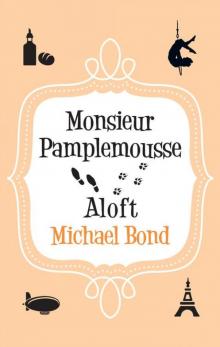 Monsieur Pamplemousse Aloft
Monsieur Pamplemousse Aloft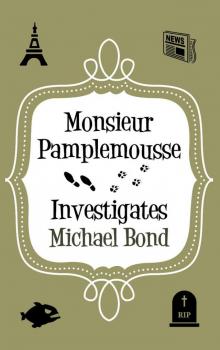 Monsieur Pamplemousse Investigates
Monsieur Pamplemousse Investigates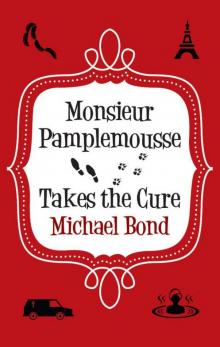 Monsieur Pamplemousse Takes the Cure
Monsieur Pamplemousse Takes the Cure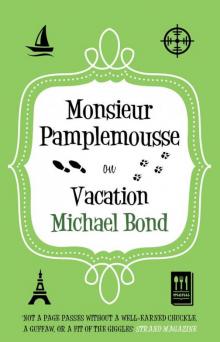 Monsieur Pamplemousse on Vacation
Monsieur Pamplemousse on Vacation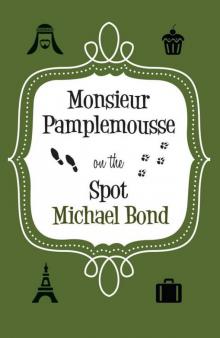 Monsieur Pamplemousse on the Spot
Monsieur Pamplemousse on the Spot Monsieur Pamplemousse Hits the Headlines
Monsieur Pamplemousse Hits the Headlines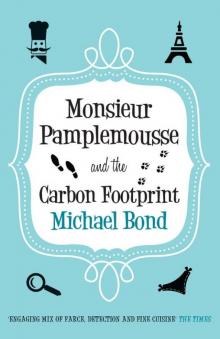 Monsieur Pamplemousse and the Carbon Footprint
Monsieur Pamplemousse and the Carbon Footprint Love from Paddington
Love from Paddington Paddington’s Finest Hour
Paddington’s Finest Hour Paddington Complete Novels
Paddington Complete Novels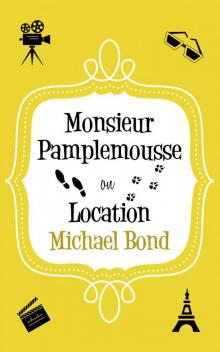 Monsieur Pamplemousse On Location
Monsieur Pamplemousse On Location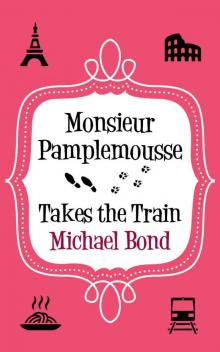 Monsieur Pamplemousse Takes the Train
Monsieur Pamplemousse Takes the Train It Wasn’t Me!
It Wasn’t Me! Paddington Races Ahead
Paddington Races Ahead Monsieur Pamplemousse and the Tangled Web
Monsieur Pamplemousse and the Tangled Web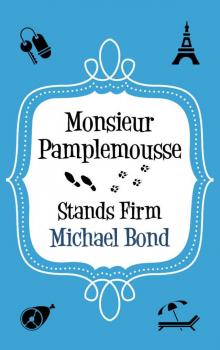 Monsieur Pamplemousse Stands Firm
Monsieur Pamplemousse Stands Firm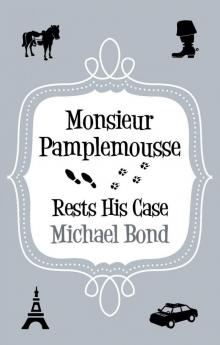 Monsieur Pamplemousse Rests His Case
Monsieur Pamplemousse Rests His Case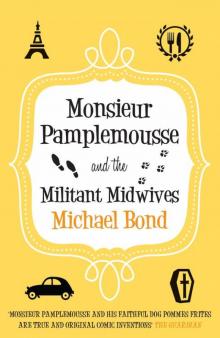 Monsieur Pamplemousse and the Militant Midwives
Monsieur Pamplemousse and the Militant Midwives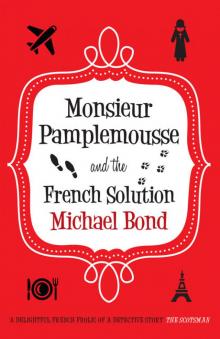 Monsieur Pamplemousse and the French Solution
Monsieur Pamplemousse and the French Solution Paddington Helps Out
Paddington Helps Out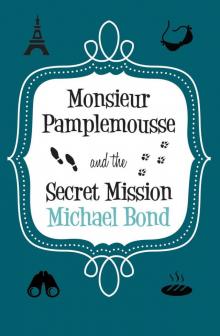 Monsieur Pamplemousse & the Secret Mission (Monsieur Pamplemousse Series)
Monsieur Pamplemousse & the Secret Mission (Monsieur Pamplemousse Series)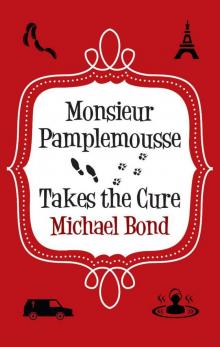 Monsieur Pamplemousse Takes the Cure (Monsieur Pamplemousse Series)
Monsieur Pamplemousse Takes the Cure (Monsieur Pamplemousse Series) A Bear Called Paddington
A Bear Called Paddington